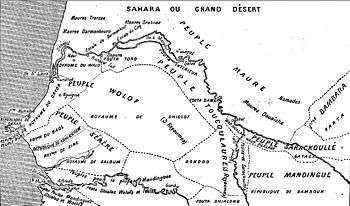Cayor
Cayor (Wolof: Kajoor; French: Cayor) was the largest and most powerful kingdom (1549–1879) that split off from the Jolof Empire in what is now Senegal. Cayor was located in northern and central Senegal, southeast of Walo, west of the kingdom of Jolof, and north of Baol and the Kingdom of Sine.
Kingdom of Cayor Kajoor | |||||||||
|---|---|---|---|---|---|---|---|---|---|
| 1549–1879 | |||||||||
| Status | Kingdom | ||||||||
| Capital | Mboul (traditional) | ||||||||
| Common languages | Wolof | ||||||||
| Religion | African traditional religion, Islam | ||||||||
| Government | Monarchy | ||||||||
| Kaabu Mansaba | |||||||||
• 1549 - ? | Dece Fu Njogu (first) | ||||||||
• 1879 | Samba Laube Fal (last) | ||||||||
| History | |||||||||
• Established | Cayor defeats Jolof at Battle of Danki 1549 | ||||||||
• French colonization | 1879 | ||||||||
| Currency | Gold dust|cowries | ||||||||
| |||||||||

In 1549, the damel (dammeel in Wolof,[1] often translated into European languages as "king") Dece Fu Njogu became independent from Jolof and set Cayor's capital at Mbul. The French, under governor Louis Faidherbe, annexed Cayor in 1868; Cayor re-established independence in 1871. France invaded again and annexed Cayor again in 1879, when it ceased to be a sovereign state. The kingdom was extinguished in its entirety October 6, 1886.
In addition to Cayor, the damels also ruled over the Lebou area of Cap-Vert (where modern Dakar is), and they became the "Teignes" (rulers) of the neighboring kingdom of Baol.
Traditionally the damel himself was not purely hereditary, but was designated by a 4-member council consisting of:
- the Jaudin Bul (Diawdine-Boul), hereditary chief of the Jambur ("free men"; French Diambour)
- the Calau (Tchialaw), chief of the canton of Jambanyan (Diambagnane)
- the Botal (Bôtale), chief of the canton of Jop (Diop), and
- the Baje (Badgié), chief of the canton of Gateny (Gatègne).
A great hero in Senegal history, for his defiance and battles against the French, was Lat Jor. He was defeated at the battle of Dekheule, and was deposed twice, in 1869 and 1879. He converted to Islam around 1861.
The 30th and last damel of Cayor was Samba Laube Fal (1858–1886), killed at Tivaouane, Senegal.
References
- Papa Samba Diop, Glossaire du roman sénégalais, L'Harmattan, Paris, 2010, p. 140-143